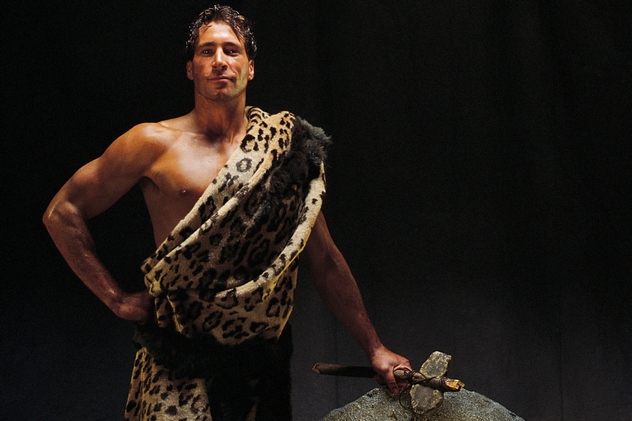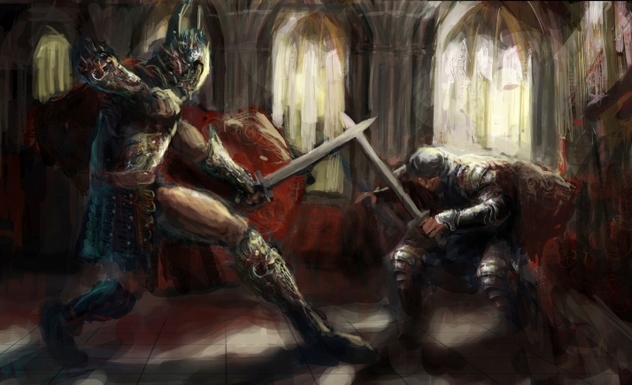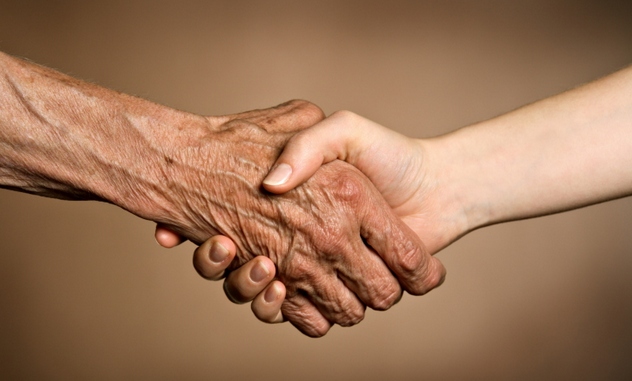 Crime
Crime  Crime
Crime  Technology
Technology 10 Hilariously Over-Engineered Solutions to Simple Problems
 Miscellaneous
Miscellaneous 10 Ironic News Stories Straight out of an Alanis Morissette Song
 Politics
Politics 10 Lesser-Known Far-Right Groups of the 21st Century
 History
History Ten Revealing Facts about Daily Domestic Life in the Old West
 Weird Stuff
Weird Stuff 10 Everyday Products Surprisingly Made by Inmates
 Movies and TV
Movies and TV 10 Actors Dragged out of Retirement for One Key Role
 Creepy
Creepy 10 Lesser-Known Shapeshifter Legends from Around the World
 Animals
Animals 10 Amazing Animal Tales from the Ancient World
 Gaming
Gaming 10 Game Characters Everyone Hated Playing
 Crime
Crime 10 Terrifying Serial Killers from Centuries Ago
 Technology
Technology 10 Hilariously Over-Engineered Solutions to Simple Problems
 Miscellaneous
Miscellaneous 10 Ironic News Stories Straight out of an Alanis Morissette Song
Who's Behind Listverse?

Jamie Frater
Head Editor
Jamie founded Listverse due to an insatiable desire to share fascinating, obscure, and bizarre facts. He has been a guest speaker on numerous national radio and television stations and is a five time published author.
More About Us Politics
Politics 10 Lesser-Known Far-Right Groups of the 21st Century
 History
History Ten Revealing Facts about Daily Domestic Life in the Old West
 Weird Stuff
Weird Stuff 10 Everyday Products Surprisingly Made by Inmates
 Movies and TV
Movies and TV 10 Actors Dragged out of Retirement for One Key Role
 Creepy
Creepy 10 Lesser-Known Shapeshifter Legends from Around the World
 Animals
Animals 10 Amazing Animal Tales from the Ancient World
 Gaming
Gaming 10 Game Characters Everyone Hated Playing
10 Weird Things About Being Left-Handed
For many people, being left-handed means there are a lot of little, everyday inconveniences that you just learn to deal with; from scissors to desks, the world was designed for right-handed people. But there are some very weird things that go along with being left-handed, including a long history of suspicion and distrust, along with a scientifically proven tendency to develop a mental illness.
10People With Psychotic Disorders Are More Likely To Be Left-Handed

Left-handed people have long been viewed with a certain amount of suspicion. Recently, science has shown that there might be a solid reason for that. In 2013, Yale University researcher Jadon Webb conducted a survey among patients diagnosed with different types of psychotic illnesses, including schizophrenia. Participants in the study were asked to fill out a questionnaire, which included the question about which hand they wrote with. The results were surprising. Researchers found that about 40 percent of those who were suffering from psychosis were left-handed. That’s a significant percentage, considering that only about 10 percent of the population is left-handed.
Researchers believe that being left-handed involves having a sort of biomarker that might indicate a predilection toward mental illness—specifically psychosis. In studies done with other groups suffering from mental illness such as depression, there was no similar correlation. When these other groups were studied, there was a much more expected pattern where the number of left-handed sufferers was comparable to the overall percentage of left-handed people in the population.
9Our Ancestors Also Had A Left-Handed Minority

We tend to think of right- or left-handed dominance in terms of modern things, like what hand we write with or use for the television remote. But, it turns out, early humans were favoring one or the other even 500,000 years ago. Researchers have taken a look at Neanderthal tools and have found that the vast majority of them show wear and tear consistent with right-handed use. Many of the tools were used in the cleaning of hides, which the individual would typically grip with their teeth and rake with a tool to clean. Teeth would often get scratched by the stone tool, and the direction of the scratches indicates which hand was used. In most cases, it was the right hand.
There were, of course, left-handed individuals. Today, about 10 percent of the population is left-handed, which seems to be fully consistent with the researchers’ findings about Neanderthals. This supports the theory that they’re much more like us than has been previously thought. Even other animals that are thought to be pretty close to us on the evolutionary tree—like gorillas and chimpanzees—are only about 5 percent more likely to favor their right hands than their left hands.
8Left-Handed Tendencies And Language

No other animal has such a huge bias against being left-handed. So why humans? It’s thought that it has something to do with language. For most people, language develops in the left side of the brain—specifically, in Broca’s area. This is where we not only develop ideas but translate them into a form of communication that others can understand. Since the left side of the brain controls the right side of the body, the prevalence of right-handed individuals is an outward sign of left-brain dominance.
However, it’s now been discovered that, in some people, language skills happen in the right side of the brain. These individuals are subsequently left-handed. It’s not just that cut-and-dried, either. The more a person favored one hand or the other, the stronger the connection was with the other side of the brain. People who use their left hand for almost everything have an extremely high chance of being right-brain language dominant. Additionally, those who have a familial history of a high rate of left-handed individuals also have a stronger right-brain language processing center, suggesting that as a species we became left-handed and right-handed when we started developing language.
7Left-Handed Spiral Stairs

It’s well known that many medieval castles have spiral staircases built as a defense measure. A spiral staircase that turns clockwise gives the defender (presumably the one backing up the stairs or coming down them) a better freedom of movement. The defender can place his left hand on the central “post” for balance and strike down with the sword in his right hand. That assumes the defenders are right-handed, which is a problem for those who aren’t. So what’s a left-handed lord to do?
Ferniehirst Castle in Scotland is the ancestral home of the Kerr family, which traces their family tree back to their arrival in Britain alongside William the Conqueror in 1066. They’re said to have a long history of left-handedness running in the family. According to the story, many of the Kerr homes and castles—like Ferniehirst—were constructed with spiral staircases that go counterclockwise (as pictured above) instead of the traditional clockwise ones. This allowed the largely left-handed clan to maximize their defenses, making it easier for them to fight while simultaneously presenting a major challenge to anyone who tried to take their castles by force. The early lords discovered the massive advantage held by left-handed fighters, and it became tradition to train all their guards and soldiers to fight left-handed. This lead to the term “Kerr-handed” or “corrie-fisted” to describe someone who favors their left hand.
6Fear Of The Left-Handed Might Be Innate

History hasn’t been kind to the left-handed. They were made to retrain their hands and even punished for using the “wrong” one. But now, science is suggesting that it’s not just the desire to make people conform to a certain standard that has created this bias against left-handed people. According to researchers at the University of Utah, things that have to do with our left side are innately more scary. For the experiment, researchers exposed their subjects to a number of different threats, coming from either their right or left side. For example, in one case, participants were told that an earthquake had hit to the left or to the right of their city (on a map shown) and asked whether they would evacuate because of the danger of aftershocks. The earthquake to their left was seen as much scarier, and more people chose to evacuate.
Similar results were found when the threat was changed to a radioactive disaster; even though the occurrence on the right was closer, the left was viewed as more of a threat. People were also more disgusted by objects on their left, as illustrated by how far out of their way they went to avoid things like fake poop. There are a couple of different theories about why this happens, such as our brain’s tendency to overcompensate for things and favor the right, as well as most of us feeling more capable of defending ourselves from threats on our stronger—right—side.
5The Left-Handed Biblical Warriors

We’ve talked a bit about how someone left-handed may have an advantage in combat, and that’s certainly been well-known throughout history. In fact, the Bible makes special mention of left-handed warriors, which has led to an interesting debate. Needing to free Israel from the rule of the Moabites, God sent Ehud, a left-handed assassin, to carry out one of the most gruesome Biblical assassinations. A big deal is made of left-handed Ehud sneaking his double-bladed dagger into the king’s presence by hiding it on his right thigh. Ehud is far from the only left-hander that the Bible mentions. These Biblical left-handers were warriors that came from a tribe called the Benjamites.
According to Judges, the Benjamites were incredible warriors that could hit a single human hair with a sling and used a bow with unparalleled ambidextrous skill. There is debate as to how this warrior tribe developed the left-handed fighting style. One theory states that the Benjamites were simply predisposed to being left-handed, much like the abovementioned Kerr family. Another theory focuses on the translation. The words used to describe their left-handed fighting style didn’t just mean “left-handed” but also, quite literally, “restricted in his right hand.” Some think that this translation hints at the tribe taking great lengths to retrain right-handed people to use a left-handed fighting style, giving them an edge in battle. It’s also possible that the Bible took special note of specifically left-handed Benjamites because of the humor in their name: “Benjamin” translates as “son of my right hand,” so the left-handed Benjamites were, ironically, “left-handed right-handers.”
4King George VI And Retraining Of Left-Handed Children

The bias against left-handed children has resulted in some pretty extreme measures. A Zulu child who ate his porridge with his left hand could expect to have that hand burned in the hot porridge as a lesson. Even in 20th-century Britain children could expect to have their left hand tied down to make them use their right one. British child psychologists that supported this retraining method also preached that children who used their left hand were simply demonstrating—and developing—a defiant personality that needed to be corrected as soon as possible.
Even kings weren’t exempt from this; tutors struggled to get the young Duke of York (later George VI) to start using his right hand instead of his left, along with working on his well-known stutter. This, along with other children developing stutters after similar retraining, gave rise to the idea that the two were somehow connected. A number of medical works were presented on how retraining children to become right-handed would lead to the development of a stutter, as well as conditions like dyslexia and other reading difficulties. It was put forth that switching dominant hands led to a struggle for dominance between the two sides of the brain, which in turn manifested itself in a stutter. This theory led to a massive rethinking of the whole retraining idea, and the practice began to die out.
Nowadays, it’s thought that there’s a different reason that children forced to change their hand of choice can develop a stutter: It has more to do with being put in a stressful situation than with the two sides of the brain arguing with each other.
3Cesare Lombroso’s Theories On The Left-Handed

Since Lombroso was a physician who lived at the turn of the 20th century, you’d expect his opinions on the matter of left-handed people to have been a little more clinical and forgiving . . . but we’ll let his words speak for him: “Man advances in civilization and culture; he shows an always greater right-sidedness as compared to . . . women and savage races; [who] even when they are not properly left-handed have certain gestures and movements which are a species of left-handedness.” In case that leaves any doubt as to his position on the matter, he went on to explain it.
Lombroso thought that there was a higher part of the brain that was connected to logic and reason, while the lower part of the brain was responsible for governing man’s baser urges and emotions. It was this lower brain that dictated the lives of the left-handed, as well as of criminals, lunatics, and the generally wicked. He also said that while a person who’s left-handed wasn’t necessarily bad, left-handedness was one of the traits that he had found to be present in “the worst characters among the human species.” Lombroso pointed to a long history of bias against the left-handed in support of his theory, which, at the time, was viewed as medical fact and pretty new, revolutionary science. Weirdly, his ideas haven’t gone away. Scientists as recently as the 1990s have used his work as a basis for their studies that have concluded that left-handed people were more prone to genetic disorders and had shorter lifespans.
2Debunking The Myth Of Shorter Lifespans

Speaking of the myth that left-handed people don’t live as long as right-handed ones, let’s take a look at that oft-repeated statistic. According to a study published between the late 1980s and early 1990s, a survey of 2,000 people living—and dying—in Southern California led researchers to conclude that left-handed people were, on average, nine years younger when they died. Researchers then went on to speculate that the cause of death had something to do with living in a world designed for right-handed people; statistics like left-handed drivers being about five times more likely to die in a car accident seemed to support this theory. Sort of. They also looked at the number of other types of accidents left-handed people were involved in and chalked it all up to them having to deal with the daily difficulties of using things designed for right-handed people, like knives and power tools. Sounds . . . almost right?
Our left-handed readers will be glad to know that the theory has since been debunked as total garbage. The numbers might work and the method might have been theoretically sound . . . so where’s the discrepancy? The problem is a weird one. Throughout history, left-handed people have been forced to become right-handed, and that practice has only really recently begun to change. So when researchers took a look at how many people had died, their results were skewed. To collect data for their study, they called the families of the deceased and asked them whether their loved ones had been right-handed or left-handed; given the age of the people the survey was investigating, there was undoubtedly a large number of left-handed people who had grown up in a world where being left-handed was discouraged and frowned upon. So not only would they have tried to hide their left-handed tendencies, but their families would have identified them as largely right-handed. Those who admitted to being left-handed tended to be younger, having grown up after the stigma went away. This made it seem like the young deaths of left-handed people were representative of the whole.
1Being Left-Handed Might Help You Survive The Apocalypse

The end is nigh, society is crumbling, and civilization is falling apart. People are scrambling for whatever supplies they can find in order to make it through the night. Chances are, you’ve been part of (or at least overheard) a conversation about what you’d require to get you through the apocalypse. You probably have never heard someone say that they’d like to be left-handed, but perhaps that should actually be the first answer they think of. If you’ve seen Rocky, you know how much of an advantage left-handed fighters have, and studies have shown that the more lawless the society, the greater that advantage is.
The baseline for the population’s percentage of left-handed people is around 10 percent, but in some societies that number is far greater. Among Venezuela’s Yanomami tribe, about 5 in every 1,000 people are murdered yearly—and about 23 percent of the population is left-handed. For the Eipo in Indonesia, the murder rate is 3 in 1,000, and they’re about 27 percent left-handed. And then there are the people of Jimi Valley in Papua New Guinea, who have a murder rate of 5.4 in 1,000 and an above-average instance of left-handed people at 13 percent.
The study, conducted by the Institute of Evolutionary Sciences, University Montpellier, shows a measurable difference between the most violent societies and the most peaceful ones. For instance, the Dioula from West Africa have a murder rate of 0.013 in 1,000 murder and a left-handed rate of only 3 percent. Researchers conjecture that the advantage of being left-handed in a violent society isn’t just a matter of survival, it’s a matter of natural selection and allowing one generation to pass its left-handed traits on to the next.








